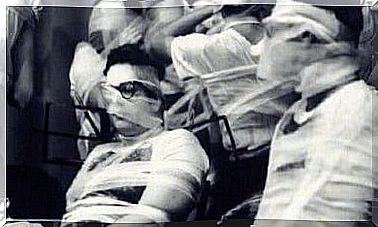Hypervigilance In The Relationship

Some people act like detectives in a relationship, looking for clues and signs to verify that everything is going well. They continuously monitor their partner’s behavior in a constant state of hypervigilance in the relationship, which in the long run causes arguments and conflicts.
The presence of hypervigilance in a relationship tends to distort reality little by little. It starts with small arguments or doubts until almost all the movements, gestures and words of the partner are questioned. The hypervigilant person finds signs that in reality do not exist because he is distrustful of the intentions of the other.
The anguish of hypervigilance
Psychologist Tyan Dayton describes hypervigilance in the relationship as a state of stress and distress that occurs in certain situations underlying the trauma.
When hypervigilance is present in the parental relationship, children are more likely to have a tendency to develop this same conduct in their relationships. Somehow, they learn it from childhood and assimilate it. However, there may be other reasons as well.
For example, if we have been the victim of a betrayal in another relationship and it has had a very strong emotional impact on us, we could use hypervigilance as a strategy to make sure it doesn’t happen again.
The problem is that such behavior ends up generating states of anguish and feeds the seed of distrust in the relationship.

On the other hand, the opposite situation can also occur; or that we have been unfaithful to our partner and end up projecting insecurity and fear onto him or her. It is thus possible to develop hypervigilant behaviors at some point.
Finally, people with emotional dependence tend to over-watch their partners. This is due to the intense fear of losing them due to their low self-esteem and certain unconscious beliefs that lead them to act in an unhealthy way.
The wrong interpretation of the signals
One of the main characteristics that indicates the presence of hypervigilance in the relationship is the misinterpretation of the partner’s behaviors. This can happen because some signals (gestures or words) are compared with other past ones. It is usually a consequence of the distress, stress, or fear experienced.
An example would be when the partner is quieter than normal or receives a lot of messages on their cell phone. If an ex has been unfaithful to us or before breaking up the relationship has shown silence in different situations, our mind could activate the alarm signal and with it the hyper-vigilance mechanism.
Irrational thoughts begin to come up like “he’s too quiet, something is wrong”, “he gets a lot of messages, maybe he’s flirting with another person” or “he’s no longer interested because he hardly talks to me”.
These negative thoughts increase distrust and can even lead to outbursts of anger. In this way, the couple’s relationship deteriorates, especially if we do not talk to the partner about what is happening to us and draw our own conclusions.
It is therefore important to admit a situation of hypervigilance in the relationship and seek professional help.
The weight of past experiences on hypervigilance in the relationship
Changing our understanding of relationships, especially couples, resolving past experiences and deep-seated traumas and learning strategies to manage emotions will be essential to avoid hypervigilance.
If there is any problem in our relationships, if we experience moments of strong anguish and distrust, we must take action to resolve the situation. Hyper vigilance will not only harm the current relationship, it will also prevent us from growing and enjoying healthier relationships in the future.

It is important to remember that hypervigilance in the couple relationship is sometimes “normalized” ; therefore it is difficult to recognize it. However, recognizing in the first place the damage that this constant alert attitude causes will allow us to take action to start resolving it.
Each of us has a responsibility to overcome our traumas, negative experiences and emotional pain to build healthy relationships that give rather than take away.









